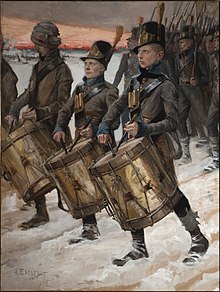March of the Men of Pori
|
|
|---|---|

March, painting by Albert Edelfelt, 1900
|
|
| Genre | Honorary march |
| Text |
|
| Language | Swedish |
| Meter | Jambic |
| Published | 1860 |
Björneborgarnas marsch (original Swedish title; Porilaisten marssi in Finnish; in English 'March of the Björneborgers' or 'March of the Pori Regiment') is the honorary march of the Finnish Defence Forces since 1918, composed by an unknown composer in the 18th century. The original text was written in Swedish by the Finnish national poet Johan Ludvig Runeberg in his epic poem The Tales of Ensign Stål. The most commonly used Finnish translation was written by Paavo Cajander in 1889, along with Cajander's translation of The Tales of Ensign Stål. The name of the march refers to the Pori Regiment in Finnish.
Björneborgarnas marsch is the honorary march of the Finnish Defence Forces and is played (only rarely sung) for the Commander-in-Chief, i.e. the President of Finland. The President has, however, the right to delegate this position to another Finnish citizen; the only time this has occurred was during the World War II, when Marshal Carl Gustaf Emil Mannerheim acted as Commander-in-Chief instead of then-President Risto Ryti. Thus, Ryti is the only President of Finland not to have been Commander-in-Chief at any point of his two terms (1940−1944).
Traditionally, Björneborgarnas marsch is played in radio or television every time a Finnish athlete wins a gold medal in Olympic games. It is also played on Christmas Eve during the Declaration of Christmas Peace ceremony, which has caused minor controversy due to the violent lyrics of the march, even though the lyrics are not sung on the occasion.
...
Wikipedia
